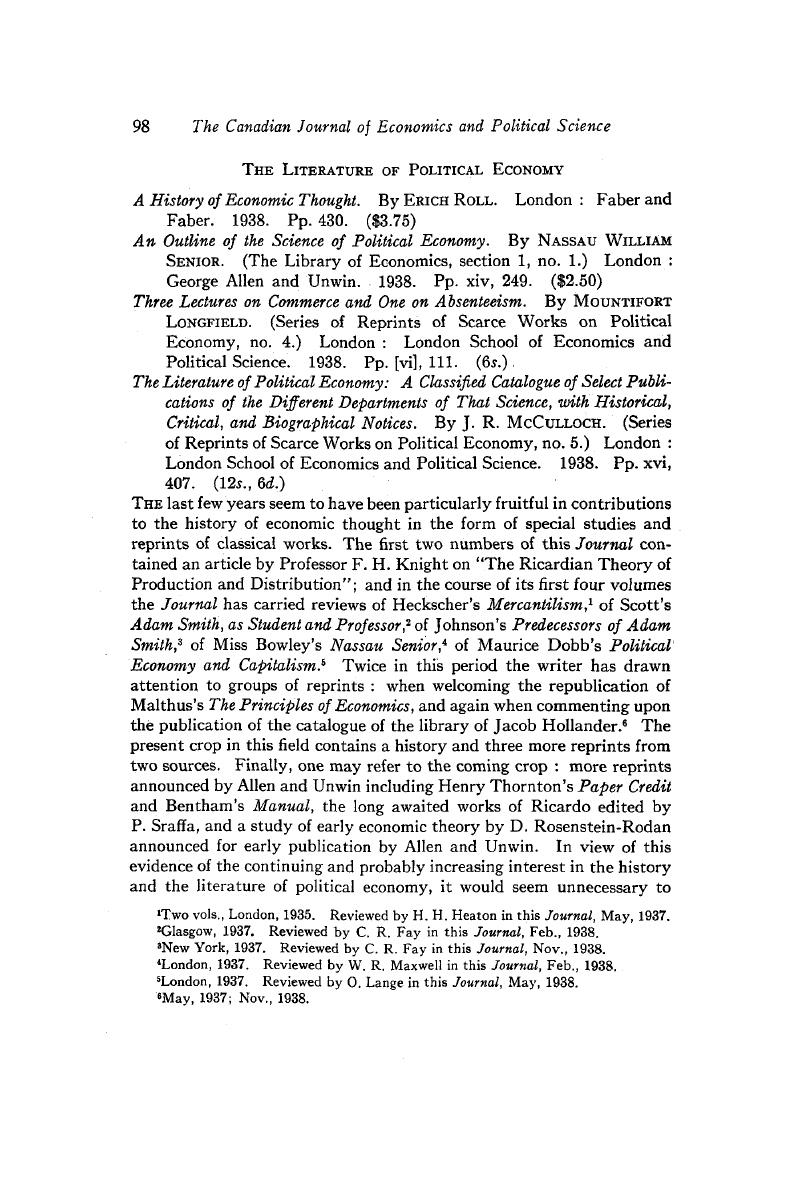No CrossRef data available.
Published online by Cambridge University Press: 07 November 2014

1 Two vols., London, 1935. Reviewed by Heaton, H. H. in this Journal, 05, 1937.Google Scholar
2 Glasgow, 1937. Reviewed by Fay, C. R. in this Journal, Feb., 1938.Google Scholar
3 New York, 1937. Reviewed by Fay, C. R. in this Journal, Nov., 1938.Google Scholar
4 London, 1937. Reviewed by Maxwell, W. R. in this Journal, Feb., 1938.Google Scholar
5 London, 1937. Reviewed by Lange, O. in this Journal, 05, 1938.Google Scholar
6 May, 1937; Nov., 1938.
7 Mun, Thomas, England's Treasure by Forraign Trade, p. 17 Google Scholar, in the reprint from the first edition of 1664 for the Economic History Society by Basil Blackwell, 1928.
8 Studies in the Theory of International Trade (New York, 1937).Google Scholar
9 Professor Roll makes numerous references to Theorien über den Mehrwert by Karl Marx: This is also available in French as Histoire des doctrines économiques, traduit Molitor, par J., 8 vols. (Paris, Alfred Costes, 1936).Google Scholar Volume I opens: “C'est William Petty qui est la fondateur de l'économie politique moderne. Son genie et son originalité sont hors de pair.” It is interesting to note the frequency with which reference is made to Petty in Capital, e.g., in the Kerr edition (Chicago, 1926), vol. I, pp. 59, 104, 113, 138, 158, 162.
10 London, 1938.
11 Hull, C. H. (ed.), The Economic Writings of Sir William Petty (Cambridge, 1899), vol. I, p. 244.Google Scholar
12 England's Treasure by Forraign Trade (1664); p. 14 in the reprint of 1927.
13 Leviathan (1651).
14 Treatise of Taxes (1662). See The Economic Writings of Sir William Petty, vol. I, p. 90.Google Scholar
15 Histoire des doctrines économiques, vol. I, p. 90.Google Scholar
16 Treatise of Taxes, quoted in Roll, p. 107. See The Economic Writings of Sir William Petty, vol. I, p. 90.Google Scholar
17 An Essay for Imploying the Able Poor (1714).
18 Boston, 1920.
19 Principles of Economics (ed. 8, London, 1927), p. 756.Google Scholar
20 Ibid., p. 756, n. 1.
21 Ibid., p. 758, n. 1.
22 Industry and Trade (London, 1923)Google Scholar, appendix D, “The English Mercantilists and Adam Smith,” p. 744; see also p. 44. Cf. Principles of Economics, pp. 846-7. For further discussion of naturalism in, and of the numerous types of intervention justified by, Adam Smith, see Viner, J., “Adam Smith and Laissez-Faire” in Adam Smith, 1776-1926 (Chicago, 1928).Google Scholar
23 For fuller discussion of this point see Bladen, V. W., “Adam Smith on Value” in Essays in Political Economy in Honour of E. J. Urwick (Toronto, 1938).Google Scholar
24 Compare K. E. Boulding on “the coefficient of transformation,” supra, p. 10.
25 Cambridge, 1933.
26 Wealth of Nations (Cannan ed. republished in the Modern Library, New York, 1937), pp. 843–4.Google Scholar
27 Ibid., p. 780.
28 Ibid., p. 788.
29 Ibid., p. 844.
30 E.g., Gray, Alexander, The Development of Economic Doctrine (London, 1931).Google Scholar “If profit springs only from the labour employed … then the rate of profit in different industries will vary according as the proportion of variable capital is high or low.… The subsequent history of this conundrum furnished one of the few comedies of economic literature. The promised solution did not appear in Volume II. … The solution [is] offered to the undiscerning in the third volume…. Marx has replaced Volume I by a mere cost-of-production theory such as a vulgar economist like Adam Smith might have evolved in his most vulgar and least enlightened moments” (pp. 319-22). It should be noted that Marx did not refer to Adam Smith as a “vulgar” economist; he distinguished the classical economists whom he respected, including Petty, Adam Smith, and Ricardo, and the vulgar economists, including “ce miserable MacCulloch,” and Senior. “The hour of vulgar economy had struck. Exactly a year before Nassau W. Senior discovered at Manchester that the profit (including interest of capital) is the product of the last hour of the twelve, he had announced to the world another discovery. ‘I substitute,’ he proudly says, ‘for the word capital, considered as an instrument of production, the word abstinence.’ An unparalleled sample this, of the discoveries of vulgar economy. It substitutes for an economic category, a sycophantic phrase-voilà tout” ( Capital, vol. I, p. 654).Google Scholar
31 The student is advised to read the relevant section of Fraser's, L. M. Economic Thought and Language (London, 1937).Google Scholar See especially the appendix on “The Labour Theory of Value,” p. 117. Professor Fraser clearly demonstrates the plurality of meaning of the word “value” in the classics, in the same book, often on the same page.
32 Reprinted by the London School of Economics in 1931.
33 Delivered in Oxford from the Drummond chair; reprinted in Economic Journal, Economic History Series, May, 1927.
34 Privately printed; second edition with additions, 1862.